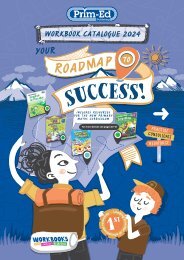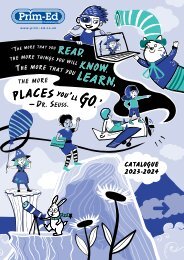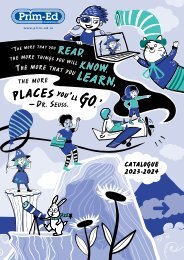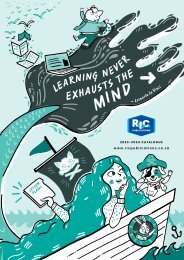RIC-6242 Primary Grammar and Word Study - Book C
You also want an ePaper? Increase the reach of your titles
YUMPU automatically turns print PDFs into web optimized ePapers that Google loves.
Parts of speech<br />
Adverbs<br />
Focus<br />
Common adverbs of manner<br />
Definition<br />
• An adverb is a word that adds information, usually<br />
to a verb <strong>and</strong> can tell how (manner), when (time) or<br />
where (place) something happens.<br />
Example:<br />
She searched anxiously for her car keys. (an<br />
adverb of manner)<br />
Note: Adverbs can modify (add information to) any<br />
words that are not nouns or pronouns.<br />
Explanation<br />
• Adverbs clarify meaning by telling more about the<br />
action, allowing for greater precision <strong>and</strong> adding<br />
interest to writing.<br />
• Because of the connection between verbs <strong>and</strong><br />
adverbs, it is difficult not to discuss or identify<br />
adverbs without reference to the verbs they modify.<br />
For this reason, the verbs in the text are all bold<br />
italic.<br />
• Encourage students to use the word ‘adverb’ <strong>and</strong><br />
remind them that adding adverbs makes verbs more<br />
informative <strong>and</strong> interesting.<br />
Worksheet information<br />
• Read the text to the students, <strong>and</strong> discuss different<br />
things crocodiles do.<br />
• Read the text with the students. Point out the words<br />
in bold italics <strong>and</strong> ask them what these words have<br />
in common <strong>and</strong> why they have been highlighted in<br />
this way. (They are all verbs or doing words.)<br />
• Revise verbs. (See pages 6–13)<br />
• Explain that the word in the box to the right of each<br />
sentence is the answer to a ‘How?’ question about<br />
the verb.<br />
• Model some questions <strong>and</strong> answers.<br />
Example:<br />
How do you slip into the murky water?<br />
I slip easily into the murky water.<br />
• Select students to model some questions <strong>and</strong><br />
answers.<br />
• Explain that words telling how something happens<br />
are called adverbs.<br />
• Students work with a partner to ask <strong>and</strong> answer all<br />
the questions as modelled.<br />
• Explain to students the link between verbs <strong>and</strong><br />
adverbs in the sentences.<br />
• Before students complete Question 1(b), discuss<br />
the placement of adverbs <strong>and</strong> explain that they<br />
don’t always have to be at the end of a sentence.<br />
Encourage them to put the adverbs where they think<br />
they sound best.<br />
• Explain that for Question 2 they should look at all the<br />
adverbs before selecting the one they think is the<br />
best.<br />
• Provide opportunities for students, after they have<br />
completed Question 3, to share their answers with<br />
the class, using complete sentences.<br />
Example:<br />
I wish I could dance perfectly.<br />
Ideas for further practice<br />
• Students, in groups of 3–5, select a card with an<br />
adverb of manner written on it; for example: politely,<br />
happily, bravely. They then write the adverb <strong>and</strong> a<br />
list of things they could do in this manner on a large<br />
sheet of paper using a felt-tip pen.<br />
The card <strong>and</strong> sheet of paper is later passed to<br />
another group, so they can add their ideas to the list.<br />
Provide opportunities for students to share their<br />
ideas with the class. They should include the adverb<br />
each time they read an idea.<br />
Example:<br />
‘We visit the dentist bravely.’ ‘We speak politely.’<br />
©R.I.C. Publications<br />
Low Resolution Images<br />
Display Copy<br />
Answers<br />
Teacher check<br />
<strong>Primary</strong> grammar <strong>and</strong> word study 18<br />
www.ricpublications.com.au R.I.C. Publications ®<br />
ISBN 978-1-74126-766-2


















